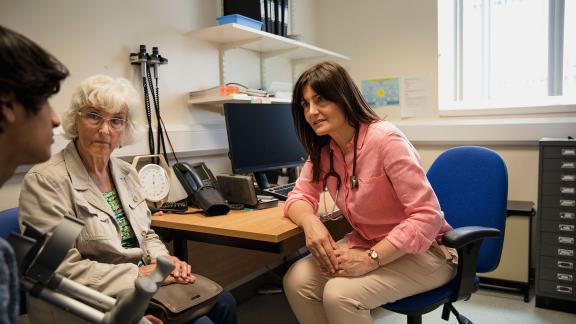Access to GP services and NHS dentists : Opposition Day Debate
Key points
- GP services have been under unprecedented pressure over the course of the COVID-19 pandemic and as we’ve moved out of the peaks of the virus. This has been due to expanding list sizes, patients presenting to primary care in a worse state and with more complex requirements, and patients needing more support as they wait for treatment, such as an elective procedure, from other parts of the NHS.
- Also, many routine but non-urgent primary care services were disrupted to respond to the prioritisation in national policy of the COVID-19 vaccination programme.
- Primary care has been working incredibly hard to meet increased need and has recruited to over 182,000 new roles to help with this over recent months, such as clinical pharmacists, mental health practitioners and social prescribers.
- In many areas of the country, primary care is working closely with other parts of the health system in new and innovative ways to ensure patients get the best possible care and that resources are used wisely.
- However, challenges remain – most notably with GP numbers continuing to fall and there is a lack of capital investment.
- The Government must urgently publish a fully funded, long-term plan for the whole health and care workforce, including primary care. It must also ensure the focus on and investment in clearing the elective backlog does not come at the expense of primary and community care.

Levels of activity
Contrary to claims from some parts of the media, commentators and politicians, the level of activity in primary care is at an all-time high.
Despite growing need, the level of activity in primary care is being maintained month-on-month with over 50% more activity between February and May than during the same period two years ago.
In March, 17% more patients were seen than in February (30 million appointments took place), and this constituted a return to pre-pandemic levels of activity. A clear majority of those patients – 63 per cent – we seen face-to-face or at home. 44 per cent of these appointments took place on the day they were booked.
It should be noted however that like in other parts of the health system, there is significant variation in the primary care offer which leads to those most in need being the least likely to receive the care they need. This is because those areas with the highest levels of deprivation are the most likely to also be under-resourced and also ‘under-doctored.’ Going forward, the Government must allocate resources to primary care according to need and ensure the benefits of any future expansion to the primary care workforce are shared equitably.
Workforce
Across the health system, workforce shortages remain the core challenge and primary care is no exception.
Since 2015, we now have the equivalent of 1,622 fewer fully qualified full-time GPs. This puts more pressure on the existing workforce who our members tell us are burnt out, exhausted, and demoralised by an ever-increasing workload.
A recent report in the British Medical Journal (BMJ) found criminal acts of violence at GP surgeries across the UK have almost doubled in five years. Our primary care members share the frustrations of the public regarding the mounting pressure on services but there needs to be a zero-tolerance approach to this behaviour which is compounding the sense of demoralisation amongst primary care staff.
Further to this, continuing briefing against general practitioners from some parts of the media and some politicians further destroys morale.
In January, the Health Secretary told the Health and Social Care Select Committee that the Government are unlikely to meet the 6,000 new GP target it set during the 2019 General Election campaign.
Whilst this in and of itself is a huge cause for concern, more GPs alone would not solve the issues in primary care. Instead, the NHS Confederation believes the Government must urgently publish a fully funded, long-term health and social care workforce plan to ensure it can meet population need across the whole health service. This must include more GPs but also build on the multidisciplinary teams that primary care has recruited in recent years as these roles can be central to supporting people to ‘live well’ in the community and reduce pressures on hospital services
Capital investment
Like the rest of the health system, primary care continues to face significant challenges in terms of capital and estate.
In a recent survey of NHS Confederation members, 92 per cent of primary care members told us they disagreed with the statement ‘my organisation has access to sufficient capital funding to transform services in line with the NHS Long Term Plan’, and 83 per cent of primary care members disagreed with the statement ‘my organisation has access to sufficient capital funding to enable us to meet the care backlog in our local area.’ 80 per cent of primary care members told us they disagreed with the statement ‘my organisation has access to sufficient capital funding to enable us to provide services in the most efficient ways and therefore to increase productivity.’
Members of our primary care network tell us they have no additional space on their sites to accommodate new GPs and other additional clinical primary care staff despite them being desperately needed.
Whilst the additional investment for the NHS announced by the Government this past year has been very welcome and NHS leaders are working hard to put it to good use, cap
The Fuller Stocktake on Primary Care
The NHS Confederation welcomed the Dr Claire Fuller’s Stocktake on primary care and our members were pleased to have had significant opportunities to input to it.
The NHS Confederation said that the review must be a watershed moment for establishing primary care as an integral part of local systems as we move to Integrated Care Systems (ICS) being put on a statutory footing from 1st July.
Dr Fuller’s recommendation to establish integrated neighbourhood teams alongside hospital, community and other specialists is one the NHS Confederation wholeheartedly supports. These teams will help to improve integration and reorientate the system (though workforce, funding and infrastructure) to a population health approach. It’s critical that the Government, national and regional NHS partners take forward the recommendations and implement them swiftly.
Dr Fuller was clear that much of the challenge currently facing primary care was beyond to scope of the stocktake – including falling GP numbers, insufficient funding and complicated contractual and commissioning arrangements. We agree that without addressing these bigger issues, there won’t be a step-change in primary care as needed.
Calls to Government
- Government must allocate resources to and between primary care providers equitably to ensure those communities with the greatest health need have the most support. This will also ensure a preventative approach can be embedded across the health system.
- Government must ensure it provides as much focus and resource for primary and community care as it does for tackling the elective backlog.
- Government must review capital spending across the NHS ahead of the Autumn Budget to ensure primary care and the whole health system can deliver the best possible care in the most efficient way.
- Government must be honest with the public about the scale of the challenge facing primary care and stop briefing against those working in the sector which is further driving the numbers leaving general practice.
- Government must urgently publish a fully funded long-term health and social care workforce plan to ensure population level need for health and social care can be met.



